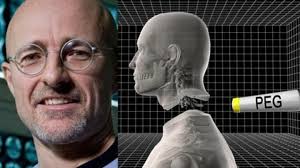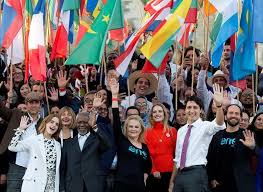 You may have read a couple of weeks or so ago of a Montreal housing complex here in Canada that was until recently moving in the direction of becoming more or less an Islamic enclave, fully compliant with Sharia law. For one thing, they would refuse to pay interest on their mortgages, which Nabil Warda, the mover and shaker behind this scheme, describes it in these terms:
You may have read a couple of weeks or so ago of a Montreal housing complex here in Canada that was until recently moving in the direction of becoming more or less an Islamic enclave, fully compliant with Sharia law. For one thing, they would refuse to pay interest on their mortgages, which Nabil Warda, the mover and shaker behind this scheme, describes it in these terms:
“A lot of Muslims have problems with the idea of interest, which in Arabic is called riba,” Warda said. “That means if you pay more than you were loaned, you are doing something that is very, very, very, very bad from the Muslim point of view.”
I wonder how bad are four ‘verys’ before bad? Badder than, say, polygamy?
Muslims are permitted to a pay a ‘profit’ to the bank for loaning them money for a mortgage, but not ‘interest’, which may sound like hair splitting, or what the scholastics would have termed a distinction without a difference, but it seems to mean a lot to Mr. Warda, who wants his neighbourhood compliant with his version of Islam in other ways:
Women could choose whether to wear the headscarf but they could not walk around in a halter-top and shorts…“There must be some modesty in the way you dress. We don’t want women living there going half-naked down the streets. We don’t like that,” he said. “If they want to do that, let them go and live in downtown Montreal.”
I am a fan of modesty, and think there should be certain laws against outright public nudity, but shorts? And why put all the ‘immodest’ women in halter-tops in downtown Montreal, which is the only part I, and most tourists, including many Muslims one might presume, usually ever see?
Of course, Warda will permit non-Muslims to live in the neighbourhood, even pay interest on their homes, but, as he puts it, “they would have to share the values of their Muslim neighbours”.
What, perchance, are these vague ‘values’ to which he refers? And what happens if one does not share those values, or transgresses them, even inadvertently? Would fellow residents be kept on tenterhooks, fearful of offending in some particular minutiae of Sharia law? Here is one hint of a warning from Warda for all you who might enjoy a little sip of something in the fresh summer air:
If you want to drink alcohol, you drink it in your house
Ah, here we get a taste, so to speak, of the submission required for Islam. I suppose you would have to close the blinds as well, just in case Warda and his neighbours get all offended by the sight of you and that pint of darkish, foamy substance of dubious provenance. Best to keep the whole thing wrapped in a brown bag, with the lights off.
What next, one wonders? A ban on music? Images? Nativity sets and Christmas lights? The smell of bacon burgers sizzling on the grill? And even if all his fellow Muslims agree, what happens to the guy who lives just outside the ‘enclave’?
I have no problem in theory with segregation and setting up your own neighbourhoods with people of like mind and such. I certainly do not think the State should enforce ‘desegregation’, with all the problems that go along with the artificial enforced cohabitation of people who would rather not. Let people live amongst and with whom they will. Throughout the ages, immigrants of various cultures have always banded together, and to this day in cities across our fair land you still find Italian, Portugese, Vietnamese, Chinese, Irish, Ukrainian, German, Polish and even Scottish enclaves and neighbourhoods. Birds of a feather flock together; they share the same ancestry, food, music, relatives, language, traditions, all in all, the same culture.
Pope John Paul II in Centesimus Annus taught that at the basis of every culture is religion, that metaphysical point of view that colours all that we think, all that motivates our beliefs and actions:
A human being is understood in a more complete way when situated within the sphere of culture through language, history, and the position one takes towards the fundamental events of life, such as birth, love, work and death. At the heart of every culture lies the attitude a person takes to the greatest mystery: the mystery of God. Different cultures are basically different ways of facing the question of the meaning of personal existence.
These deep principles, one’s ‘take’ on these ‘fundamental events of life’ are what draw people together. Different cultures can coexist, as the multi-symbol-lame-o bumper sticker goes, in some degree of proximity, tolerating each other’s divergences, so long as they share at least some common ground on these fundamental principles, which the aforementioned immigrant communities did. Most were Christian, which became ‘American values’, and all had some level of good will towards all men.
As Saint Thomas states, it is custom, derived from culture, which has the “the force of law, abolishes law and is the interpreter of law” (I-II, 97, 4). Inherited from our fathers and forefathers, these form the primary basis of our lives together. They need not be exactly the same across cultures, and a bit of diversity is a good thing (like Irish music and Asian food), but there comes a point where they clash, often violently, as we have witnessed too often in our world, and no amount of optimistic thinking can change that.
Islam presents some peculiar and unique difficulties, which our leftist ‘elites’ and their media refuse to face. Not only is it inherently expansive, with the explicit intention of having prodigious families and gaining numerous converts (but so does Catholicism, and as the saying goes, demography is destiny), but with this difference: At its root, radical Islam it is also intolerant, often coercively and violently so, of what they perceive as ‘evil’. With a disordered view and little nuance in the degrees of such ‘evil’, they require, or at least desire, as the very name of the religion suggests, submission in all tenets of the Islamic behaviour, from diet to marriage, even from those who do not adhere to its creed.
Do you think any other religion, from Buddhist to Zoroastrian, would give a tinker’s-dam if you cracked a beer on your own front porch, or your daughter went to a pool party wearing ‘shorts’? Sure, the old retired schoolmarm, still tinged with a rather grim version of her childhood Calvinism, might glance askance from behind her curtain, at least at the ‘demon-liquor’, but so what?
Certain varieties of radical Islam, however, cannot tolerate such deviancies from ‘the faith’ and infidelities to the ‘law of Allah’, the pondering of which keep many a newly-radicalized bearded young man awake at night, gnashing their teeth.
Of course, this does not apply to all Muslims, perhaps not even most. In fact, Warda’s own imam, Foudil Selmoune, demurs:
“We are here in Canada. We came of our own will…Our intention was not to come to isolate ourselves from society or from the community.”
Selmoune goes on to suggest that it would be more constructive for Warda to use his financing proposal to help Muslims buy existing homes rather than creating a Muslim neighbourhood.
Imam Selmoune’s disagreement notwithstanding, the fact that such an enclave was even being pondered in multicultural Canada is significant, and one must wonder which version of Islam will win out in the end, Warda’s or Selmoune’s.
We might all hope that, like other religions, Islam could to some degree assimilate and accommodate, but we have seen enough examples to guess that this may never happen. The problem is that religions, with enough energetic individuals in their midst, always tend to ‘radicalize’, which literally means to ‘return to their roots’. Thus, we see ever-new radical movements amongst Protestants, Mennonites, Hippies and Back-to-the-Land-ers, Catholics and, of course, Muslims. Those with the most stark and vivid beliefs tend to be the ones most easily radicalized.
Islam, like the Arabian desert in which it arose, has remarkably ‘stark and vivid’ beliefs, and these, at least in its radical form, it very much wants to impose upon others. In its roots, it is anything but peaceful and tolerant. Au contraire: Islam under the Prophet began with war, conquest and forced ‘conversion’, and who is to say its present and future are to be any different?
The Amish and Hippies and Catholics who so ‘re-form’ themselves don’t tend to bother anyone else, within the limits of public order and the preservation of basic human rights. We don’t impose Catholicism, but propose, and if anyone converts to our creed, they do so, or should do so, freely.
Of course, while being tolerant of others’ differences, we do maintain the right and duty to convince and lead others to the truth as we see it. As the Vatican II Declaration Dignitatis Humanae states, people should be permitted to act in accord with their ‘religion’, but “within just limits” and “preserving just public order”. Of course, these concepts will apply differently in different lands and cultures, but there is a limit beyond which they break down, and certain versions of Islam stretch this limit to its breaking point and beyond. Someone like Warda can have his own daughters dress how they please (or, perhaps, as he pleases), and govern his own household as he likes, but within such limits of order and justice, as determined by rational public law as informed, ideally, by Christian revelation. Whatever his own idea of ‘revelation’, Warda’s authority over others ends at the edge of his front lawn.
The problem here is not so much with the idea of an Islamic enclave (which has since been shelved, due to widespread backlash), but with people like Mr. Warda and the religious principles he espouses. I am not sure just how hot he is for Sharia law, but who would want someone like him, perhaps even more zealous than he, as a neighbour, eyeing you out of his window? You never know what might happen if you move into the watchful ward of Warda.
President Obama is on his swan-song world tour, lecturing us in Greece recently all on why we cannot all just ‘get along’:
So my vision … may not always win the day in the short run…but I am confident it will win the day in the long run. Because societies which are able to unify ourselves around values and ideals and character and how we treat each other, and cooperation and innovation, ultimately are going to be more successful than societies that don’t.
The difficulty with the soon-to-be-former President’s pious platitudes is that one cannot just paper-maché over deep moral and cultural divides. Some cultures and peoples just do not, and likely never will, get along. Of course, this applies not only to Islam, but to any of our current deep, cultural divides, including the one brought to the fore in the recent election, between what we might term the ‘nation of Clinton’ and the ‘nation of Trump’, between ‘liberals’ and ‘conservatives’ for want of more precise terms (since neither candidate fully embodies them). These two ‘nations’ seem deeply divided over how they view life, marriage, sexuality, religion, property, freedom and human rights in general. Would Ms. Clinton want to live anywhere near her ‘basket of deplorables’, or Mr. Obama take up residence beside any of his ‘knuckle-dragging, gun-toting, Bible thumpers’? They seem mildly amazed that such people even exist. Thankfully, this intra-American divide has avoided extreme violence of one toward the other, at least so far. But the future looks rather ominous.
It is the reality of these impassible cultural divisions that the likes of Obama, Clinton, Merkel, Hollande, Trudeau, and the host of other liberal democratic leaders living within their own ‘enclaves’, want to ignore, for they don’t seem to hold to, and don’t see how anyone else can hold to, eternal, inviolable, religious truths, except perhaps vague and ever-malleable notions of ‘tolerance’ and ‘multiculturalism’. Reality has a way of biting back, however, and as many such leaders are being tossed out on their ear in elections of late, their ‘legacies’ in tatters, we are discovering, hopefully not too late, that such platitudinous bromides from our self-proclaimed elites are rather flimsy glue to hold together a society fissured along its most basic seams. As the Church has always taught, it is the faith, the ‘Catholic Thing’ as Belloc would have it, that holds society together, and without the faith, even in some vestigial attenuated form, moral and societal disintegration is inevitable. And again to the prophetic words of Belloc: The new paganism towards which we are regressing will be far darker than the old.










